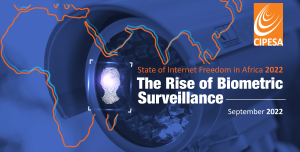KICTANet at FIFA: Launch of CIPESA’s State of Internet Freedoms in Africa 2022 Report

On the last day of the Forum for Internet Freedom n Africa, Collaboration on ICT Policy in Eastern and Southern Africa (CIPESA) launched the State of the Internet Freedoms in Africa Report 2022
Victor Kapiyo, a trustee at KICTANet, noted that the report highlights the increased appetite for biometric surveillance technologies by governments inn the continent. He notes that these technologies are used for among other uses, civil registration, election processes, immigration, financial services and telecommunication. Data use is still not protected by the laws, profiling and targeting of journalist and other persons of interests. He also pointed out the limited capacity of government officials and staff on human rights standards when collecting data .The net effect of the use of biometric surveillance technologies is very limited respect for privacy laws and a shrinking civic space
Key Recommendations to relevant stakeholders
The report makes the following key recommendations to specific stakeholders;
Government
- Implement laws on identity laws in compliance with national data protection laws and international human rights standards. Governments that are yet to put in place data protection law such as Liberia, Mozambique, Sierra Leone and Tanzania are encouraged to formulate appropriate data protection laws and institutional frameworks
- Government are called upon to ratify the African Union Convention on Cybersecurity and Personal Data Protection (Malabo Convention) which only has 14 signatories so far.
- Establish independent Office to act as oversight in the implementation of data protection laws.
Civil Society
- Lobby government to implement data protection laws and put in place relevant institutional frameworks human rights standards.
- Document the risks and abuses of data protection laws in governments’ use of biometric surveillance technologies.
Media
- Document and report civil society advocacy initiatives to keep track of development in data protection laws and policy.
- Identify and expose privacy violations arising from various biometric programs.
Private Sector
- Ensure biometric systems are developed and managed in compliance with human rights standards,
- Develop company privacy policies, effort to ensure data subjects have control and management of their data through timely access to information.
Academia
- Conduct research highlighting challenges and benefits of biometric data programs.
Angela Minayo is KICTANet’s Women’s Digital Rights Programs Officer. Her interests are on mainstreaming gender and inclusion of structurally marginalised groups online and in internet governance processes.
![]()
Visited 1239 Times, 1 Visit today
